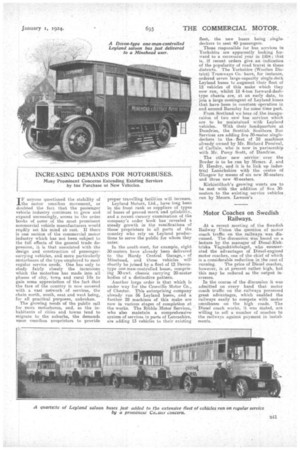INCREASING DEMANDS FOR MOTORBUSES.
Page 25

If you've noticed an error in this article please click here to report it so we can fix it.
Many Prominent Concerns Extending Existing Services by the Purchase oi New Vehicles.
IF anyone questioned the stability of the motor omnibus Movement, or doubted the fact that the passenger vehicle industry continues to grow and expand unceasingly, access to the order books of some of the most prominent commercial vehicle manufacturers would readily set his mind at rest. If there is one section of the commercial motor industry which has not been subject to the full effects of the general trade depression, it is that associated with the design and construction of passengercarrying vehicles, and more particularly motorbuses of the typo employed to meet regular service needs.' One has only to study fairly closely the incursions which the motorbus has made into all phases of city, • town and rural life to gain some appreciation of the fact that the face of the country is now covered with a vast network of services, the chain north, south, east, and west being, for all practical purposes, unbroken.
The growing needs of the public call for more motorbuses, and, as the inhabitants of cities and towns tend to migrate to the suburbs, the demands upon omnibus proprietors to provide proper travelling facilities will increase. Leyland Motors, Ltd., have long been in the front rank as suppliers Of types of buses of proved merit and reliability, and a recent cursory examination of the company's order book has revealed a steady growth in the ramifications of those proprietors in all parts of the country who rely on Leyland productions to serve the public for whom they cater.
In the south-west, for example, eight 30-seaters have already been delivered to the 'Hardy Central. Garage,. of l'ilinehead, and these vehicles will shortly be joined by a fleet of 12 Devontype one-man-controlled buses, comprising 30-cwt. chassis carrying 20-seater bodies of a distinctive pattern.
Another large order is that which is under way for the Crosville Motor Co., of Chester. This enterprising company already run 56 Leyland buses, and a further 28 machines of this make are now in various stages of completion at. the works. The Ribble Motor Services, who also maintain a comprehensive system of services in parts of Lancashire, are adding 13 vehicles in their existing
fleet, the new buses being singledeckers to seat 40 passengere.
Those responsible for bus services in Yorkshire are apparently looking forward to a successtul year in 1924; that is, if recent. orders give an indication of the popularity of road travel in these districts. The Yorkshire (Woollen District) Tramways Co.have, for instance, ordered seven large-capacity single-deck Leyland buses to augment their fleet of 12 vehicles of this make which they now run, whilst 18 4-ton forward-dashtype chassis are, at an early date, to join a large contingent of Leyland buses that have been in constant operation in and around Barnsley for some time past.
From Soot-land we hear, of the inauguration of two neW bus services which are to be maintained with Leyland vehicles. With their headquarters at Dumfries, the Scottish Southern Bus Services are adding five 30-seater singledeckers to the fleet of 38 machines already owned by Mr. Richard Percival, of Carlisle, who is now in partnership with Mr. Percy Scott, of Dumfries.
The other new service over the Border is to be run by Messrs. J. and D. Hendry, and it is to link up industrial Lanarkshire with the centre of Glasgow by means of six new 30-seaters and three new 40-seaters.
Kirkintilloch'a growing wants are to he met with the addition of .five 30seaters to the existing service vehicles run by Messrs. Lawson's
Motor Coaches on Swedish Railways.
At a recent meeting of the Swedish Railway Union the question of motor coach traffic on the railways was discussed. The discussion Was based on EA lecture by the manager of Diesel-Elektriska Vagnaktieholaget, who enumerated the advantages of Diesel-engined motor coaches, one of the chief of which is a considerable reduction in the cast. of running. The price of Diesel coaches, however, is at present rather, high, but this may be reduced as the output increases.
In the course of the discussion it was admitted on every hand that motor coach traffic on the railways possessed great advantages, which enabled the railways easily to compete with motor omnibuses oit the high roads. The Diesel coach works, it was Stated, are willing to sell a number of coaches to the railways against payment in instalments.




























